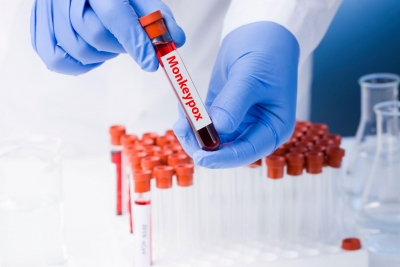Monkeypox in Delhi: Experts say remain cautious but don't panic
By IANS | Published: July 24, 2022 06:27 PM2022-07-24T18:27:02+5:302022-07-24T18:40:07+5:30
New Delhi, July 24 After the detection of a monkeypox case in the capital on Sunday, which took ...

Monkeypox in Delhi: Experts say remain cautious but don't panic
New Delhi, July 24 After the detection of a monkeypox case in the capital on Sunday, which took the nation's case tally to four, city doctors have urged people to remain cautious but not to panic.
Globally, over 16,000 cases of monkeypox have been reported from 75 countries, including five deaths in Africa, according to the World Health Organization (WHO). The UN health body on Saturday also declared the infection as a public health emergency of international concern.
Monkeypox is a viral disease that is typically identified with fever, rash and swollen lymph nodes along the skin lesions. However, it is a self-limiting disease and the patients recover within four weeks, health experts said.
"First of all, we have to understand that there is no need to panic. People need to be more cautious as monkeypox is a mild infection which has symptoms quite similar to smallpox," said Manisha Arora, senior consultant in internal medicine at Sri Balaji Action Medical Institute.
"Monkeypox is spread among humans by respiratory droplets and contacts with body fluids of patients. Hospital surveillance and isolation of cases remain the main intervention or prevention of infection spread. There is no need to panic," added Harshal Salve, additional professor, Centre for Community Medicine, AIIMS.
In a statement issued on Sunday, the Union Health Ministry said the 34-year-old male patient from Delhi is presently recovering at a designated isolation centre at the Lok Nayak Hospital.
"Close contacts have been identified and are under quarantine as per the Health Ministry guidelines," it added.
As per the ministry guidelines, public health interventions like identification of the source of infection, enhanced contact tracing, testing sensitisation of private practitioners etc. are being carried out.
Monkeypox is transmitted from infected animals to humans via indirect or direct contact. Human-to-human transmission can occur through direct contact with infectious skin or lesions, including face-to-face, skin-to-skin, and respiratory droplets.
Among the reported monkeypox cases, transmission appears to be occurring primarily through close physical contact, including sexual contact.
Transmission can also occur from contaminated materials such as linens, bedding, electronics and clothing carrying infectious skin particles.
In the WHO South-East Asia region, five cases of monkeypox have been reported so far, four from India and one from Thailand.
The infected Delhi man reportedly has no history of foreign travel, but got infected at a stag party in Himachal Pradesh.
"We should all know about the transmission root of this virus. It spreads by close contact, skin-to-skin contact and droplet infection. So, we have to be careful about all these factors," Satish Koul, Director, Internal Medicine, Fortis Memorial Research Institute.
However, the need is to increase "efforts and measures t and devoid of stigma or discrimination", Poonam Khetrapal Singh, Regional Director, WHO South-East Asia Region, said in a statement.
Manisha Arora suggested "to avoid coming in contact with an ill person and always wash hands properly and use an effective alcohol-based sanitiser.
"Never avoid using masks," he said.
"If you have fever, have recent travel history, or you have come in contact with somebody who has manifested symptoms of monkeypox, you should immediately seek consultation from your physician. As of now, prevention is the cure," said Koul.
Disclaimer: This post has been auto-published from an agency feed without any modifications to the text and has not been reviewed by an editor
Open in app